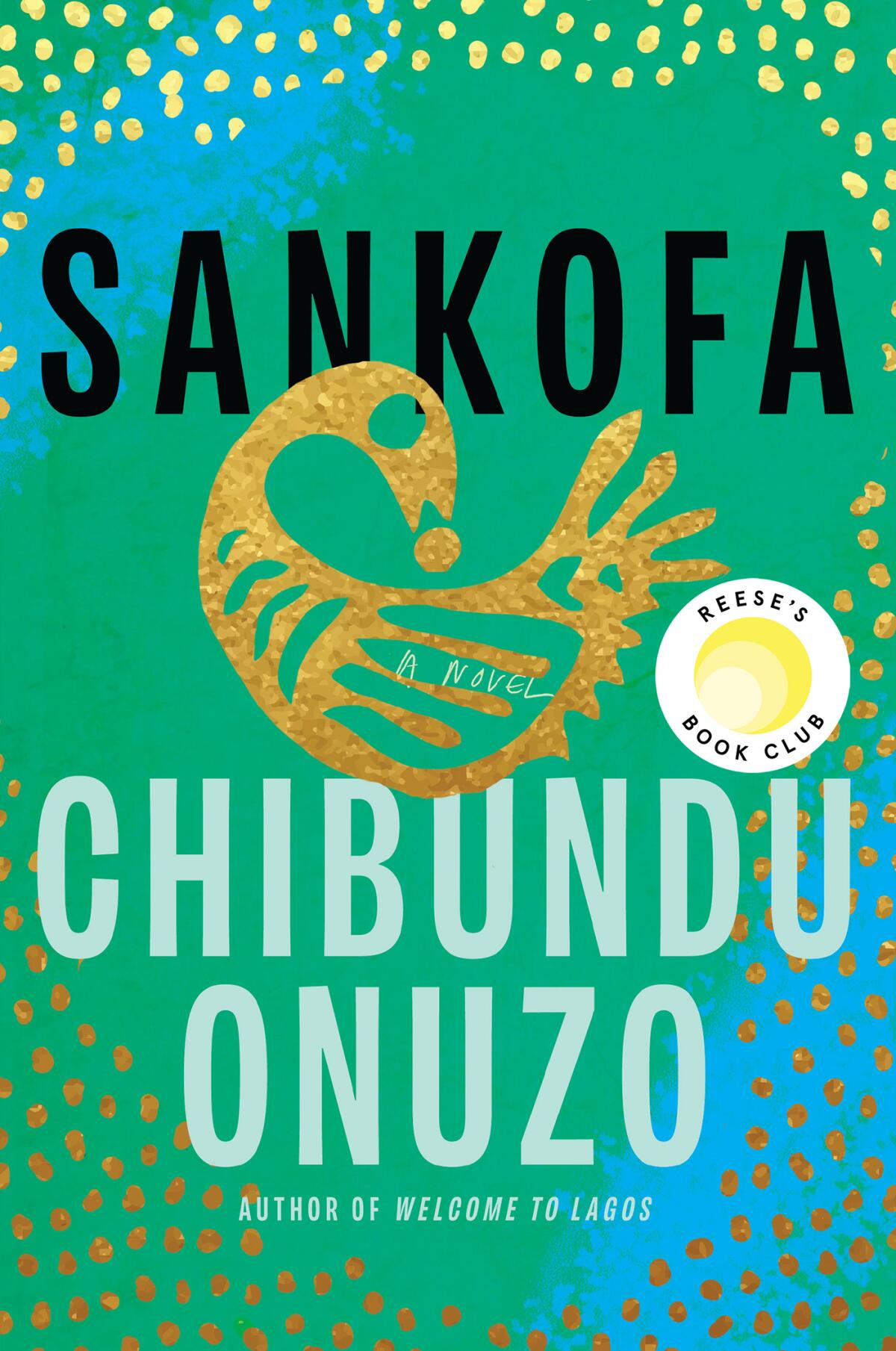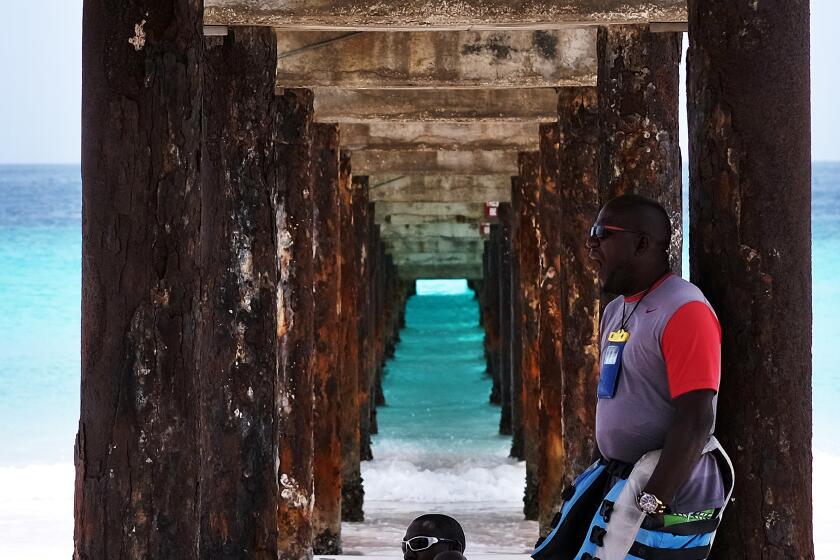Review: A dictator’s daughter comes home in Chibundu Onuzo’s ‘Sankofa’

On the Shelf
Sankofa
By Chibundu Onuzo
Catapult: 304 pages, $26
If you buy books linked on our site, The Times may earn a commission from Bookshop.org, whose fees support independent bookstores.
Chibundu Onuzo’s 2018 debut novel, “Welcome to Lagos,” revealed a city under siege from within and without. At the same time, it was illuminated by her energetic and compassionate writing — a complicated and chaotic place rendered comprehensible, at times even funny and sweet, by the individuals making their lives in it.
The Nigerian-born Londoner’s follow-up, “Sankofa,” employs an entirely different tone and perspective. (It’s also the new Reese’s Book Club pick.) Anna Bain Graham lives in present-day London, where her multiracial appearance once attracted catcalls but now seem mundane. Nevertheless, nearing 50, Anna remembers those hurtful jibes. And she remains desperately curious about her Black father, Francis Aggrey, whom she never knew. After her mother dies, Anna’s aunt sends along a trunk; beneath a false bottom are diaries written by Francis during his short stay in England and after his return to Bamana, his fictional home country on the “Diamond Coast.”
His words trace a path of increased radicalization, piquing Anna’s curiosity. She continues her research in the British Library, where she finds that, under his middle names “Kofi Adjei,” her father ruled Bamana from 1978 to 2008. “I did not know much about African politics,” Anna muses, “but to remain for three decades in power would surely make him some sort of dictator.”
Can a white woman write a rich-people satire set in Namibia? Katie Crouch pulls off a delicate balance: an embassy romp with hard postcolonial lessons
Most daughters, on learning their father had become known as “The Crocodile,” a corrupt head of state likely responsible for the deaths of five university students, would run back to the safety of their bourgeois tea tables. Not Anna Graham. First she travels to Scotland, paying a visit to Adrian Bennett, author of the only full-length book about Bamana. Adrian rightly holds her in suspicion, but the two make an uneasy truce, which helps Anna decide to make the journey to Bamana herself.
Anna embarks on her quest amid her own life’s turmoil. She and her husband of many years are divorcing, and while their daughter, Rose, seems stable, neither parent can stop wondering if her longtime eating disorder has returned. Onuzo, still just 30, ably captures the frustrations of midlife: “I was a disheveled, middle-aged woman, too old to be Kofi’s child.” That’s important, because the book’s title refers to a bird that, according to myths of the Ghanaian Akan tribe, walks forward with its head turned backward, toward its origins. Like many women of her generation, Anna hopes that learning about her past will help her move into her future.

The second half of “Sankofa” takes place entirely in Bamana, where Kofi, no longer president but still supremely powerful, combines characteristics of every notable or notorious African ruler known in the West, from the terrifying Idi Amin Dada to the inspiring Nelson Mandela. Watching Anna slowly circle her father’s protectors, finally convincing him to meet her, is like witnessing two big cats stalking each other. Kofi has his reasons for finally accepting her. Hers come later, and at a price.
Kofi puts his oldest daughter through many paces, taking her to his personal Disneyland, Gbadolite, where all the villagers wear brightly colored homespun clothes and the zoo contains a female tiger, listless without company. “We’re trying to get her a mate from a zoo in Beijing,” he says. “Of course, we could just mate her with one of the lions and create something called a liger.” The important thing, he seems to say, is not the source of the offspring but the perpetuation of the line. He introduces Anna to her sister Afua and brother Kweku — “There are no half siblings in Africa” — allowing them to conduct their own interrogations.
Cherie Jones’ debut novel, “How the One-Armed Sister Sweeps Her House,” focuses on the essential workers who make the tourist factory run.
Kofi’s intention is clear; he wants to haze her for membership in his tribe. While in Gbadolite, Anna also has an encounter with a younger woman named Marcelline, who mistakes Anna for a journalist and takes her to a hut where a very young girl is chained to a stake. The girl tells Anna her uncle did this: “He said I am the reason why his business is failing.” Of course Anna wants to help her. Of course Marcelline says she can’t. Of course Kofi will reference the incident to Anna, making her wonder if he caused the cruelty or invented it as a test for her.
In Bamana, and in the mind of Kofi Adjei, nothing is as simple as it looks from the comfortable distance of the West. A ruler who cracks down violently on student opposition can also be worthy of worship throughout the land — can be feared and loved. A culture that pushes its authentic handblocked fabrics in markets can also be one whose affluent women prefer sequins and gold beads. A bird, or a woman, can fly forward but look back to her origins throughout the journey.
But Onuzo knows better. A woman’s past cannot solve her problems. What Anna needs to recover is herself. The scene in which that happens seems overheated and overdetermined, with too many signs and symbols. But the one that matters most hits home for both Anna and the reader — the not-so-hidden homonym of her name, “anagram.” If Africa contains multitudes, so do we all — and, in “Sankofa,” Onuzo hints that the answers to our problems lie neither behind nor ahead of us, but within.
Patrick is a freelance critic who tweets @TheBookMaven.
Deesha Philyaw talks about the long gestation of her collection ‘The Secret Lives of Church Ladies,’ a Times Book Prize finalist for first fiction.
More to Read
Sign up for our Book Club newsletter
Get the latest news, events and more from the Los Angeles Times Book Club, and help us get L.A. reading and talking.
You may occasionally receive promotional content from the Los Angeles Times.










